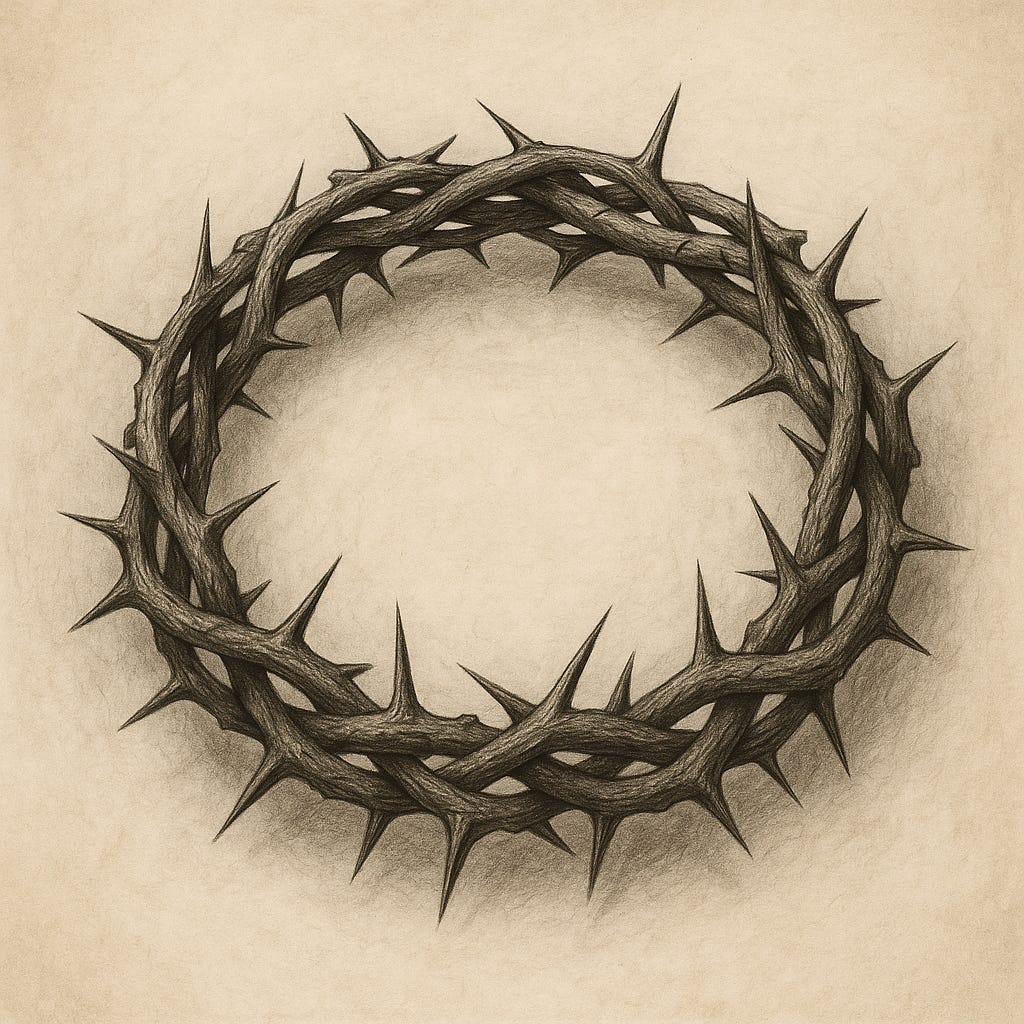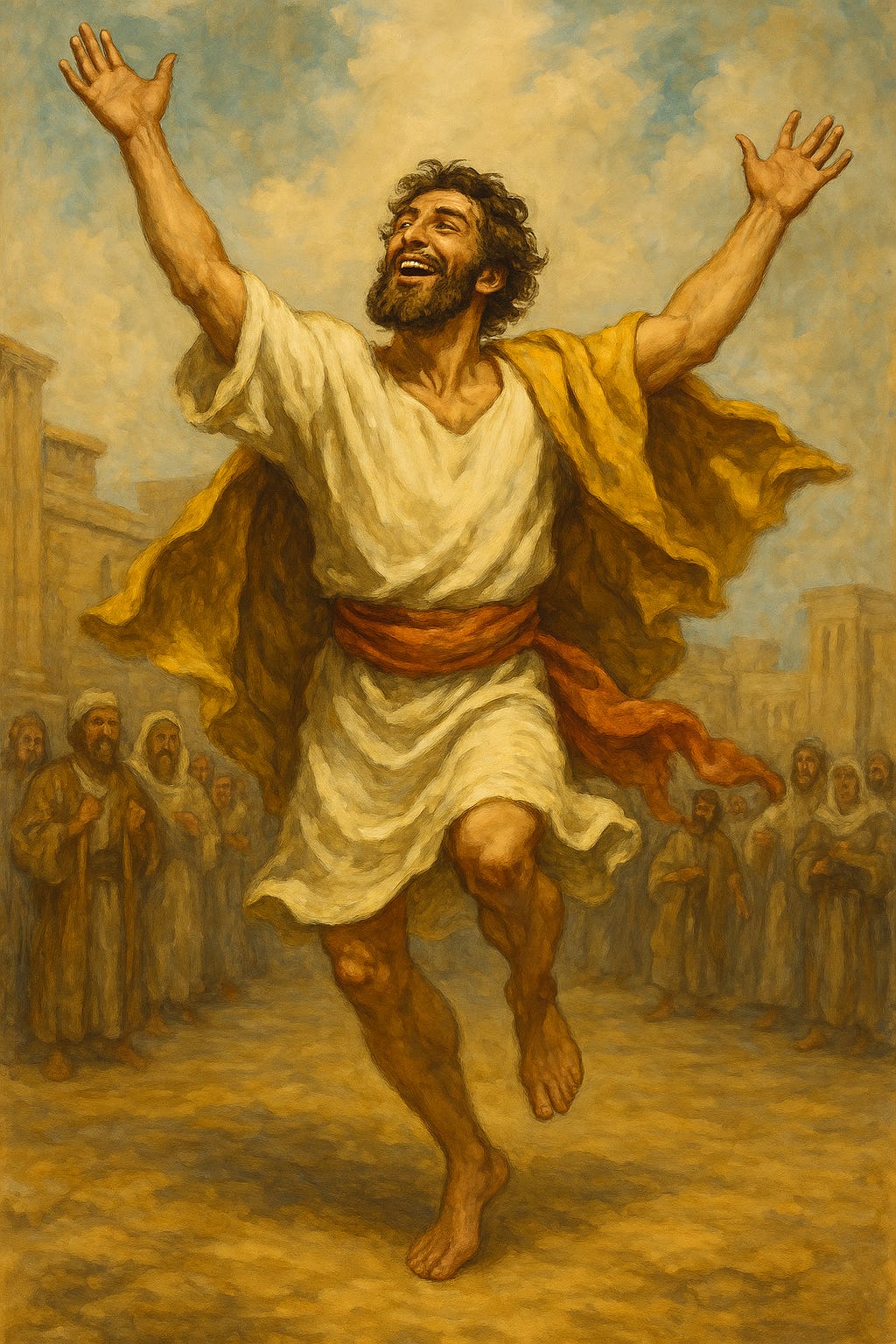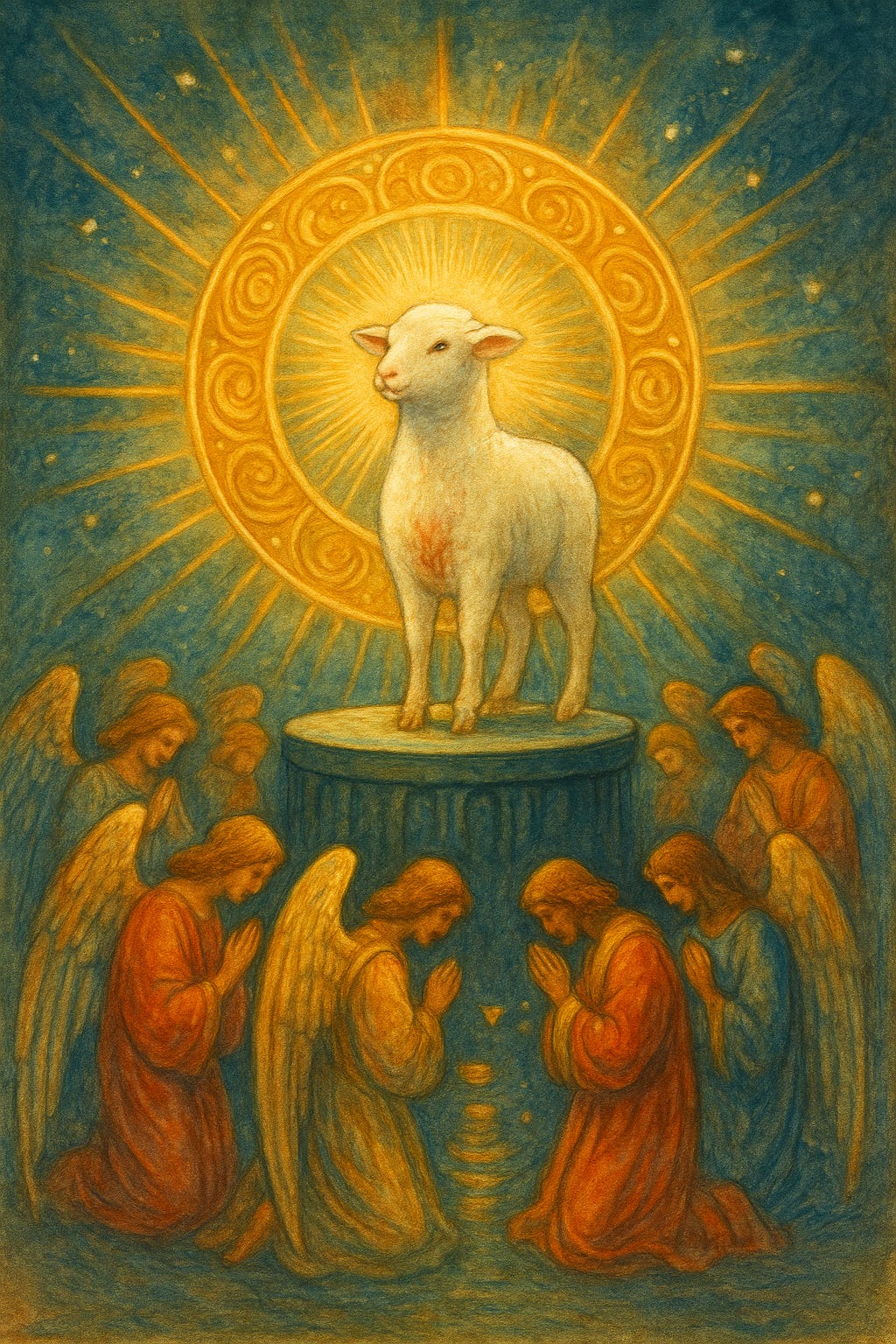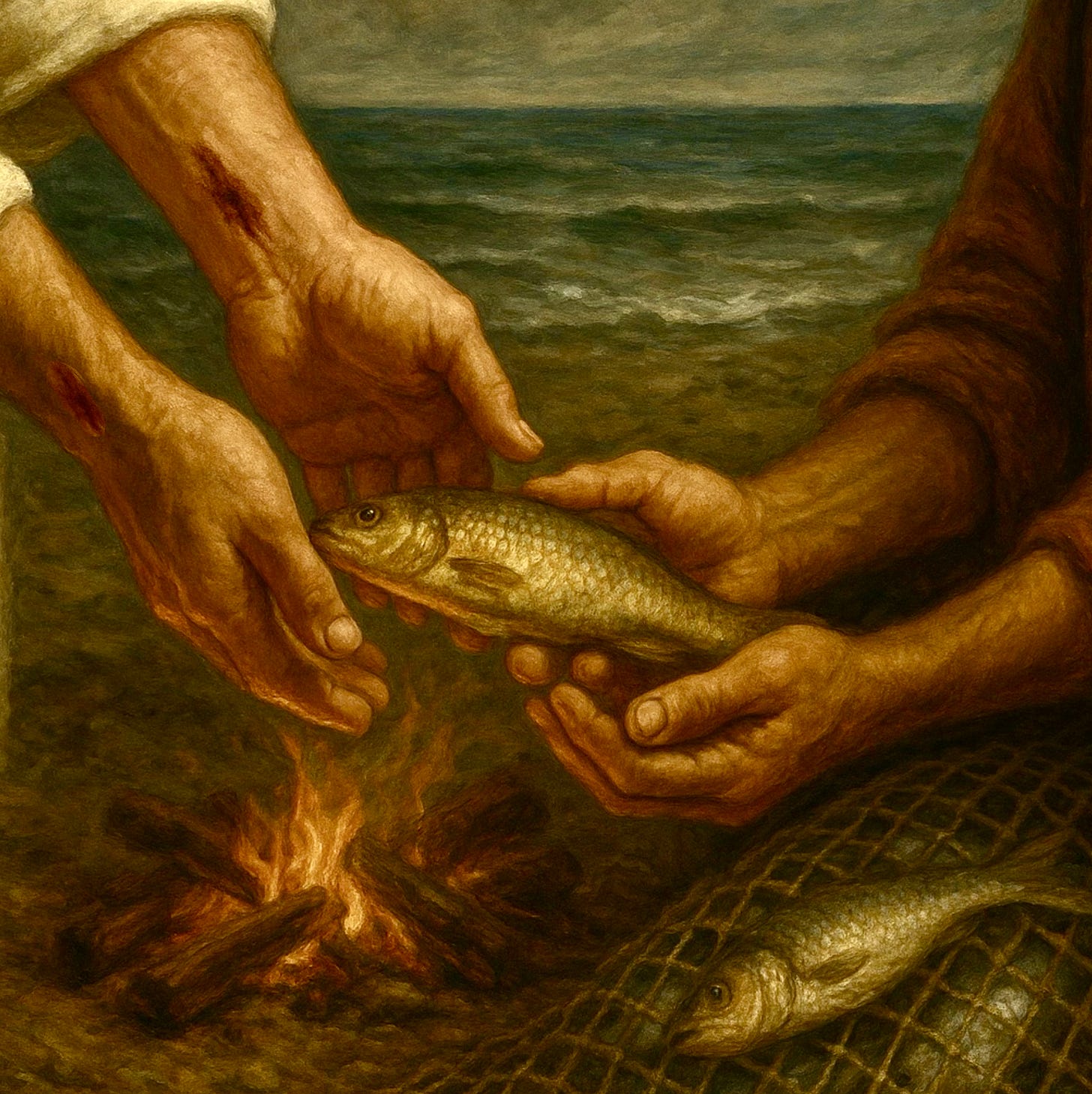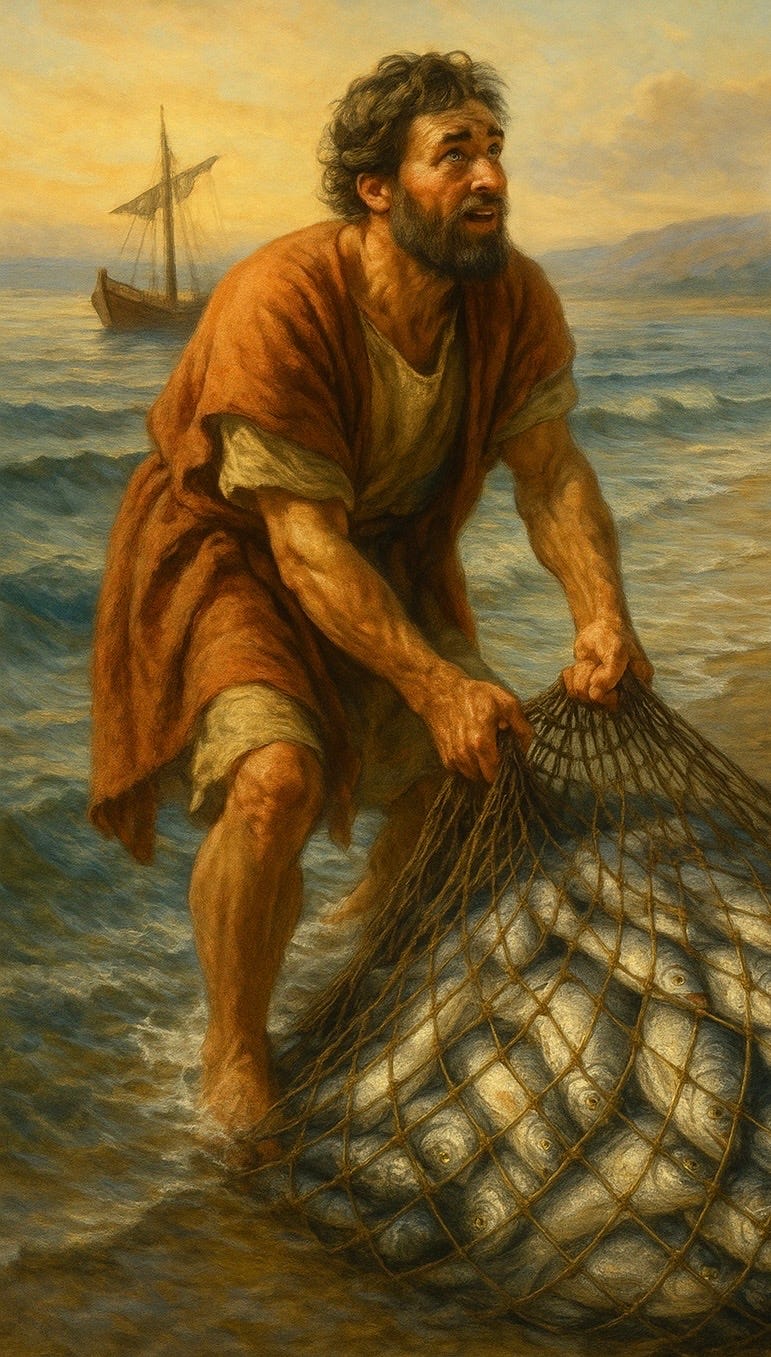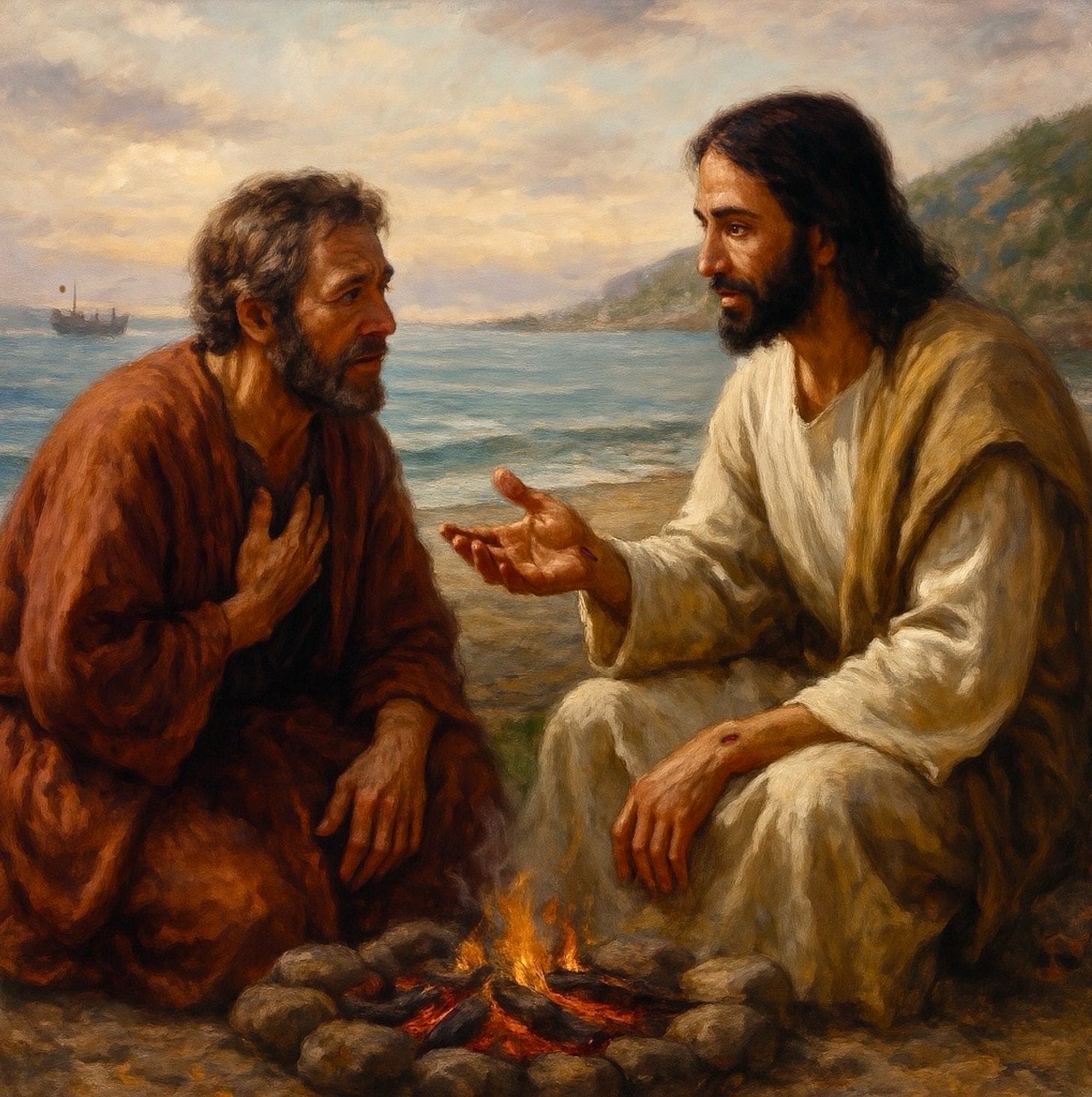Third Sunday of Easter: The Crowd Cheers the Mask, God Sees the Heart
Reflections on the Third Sunday of Easter (Year B): Acts 5:27–32, Psalm 30, Revelation 5:11–14, and John 21:1–19
Do not Boast in Wisdom, Strength, or Wealth but in the Steadfast Love, Justice, and Righteousness of the Lord
“This is what the Lord says: ‘Let not the wise boast of their wisdom or the strong boast of their strength or the rich boast of their riches, but let the one who boasts boast about this: that they have the understanding to know me, that I am the Lord, who exercises kindness, justice and righteousness on earth, for in these I delight,’ declares the Lord.” Jeremiah 9:23–24
Jeremiah exposes what some call the unholy trinity of human pride: wisdom, power, and wealth. These are the very things the world chases, and some of the very temptations Satan offered to Jesus in the wilderness.
But Jesus refused them; He did not boast in knowledge, strength, or riches. He boasted by living and exemplifying the Father’s faithfulness, justice, and steadfast love entirely in His life and ministry.
Jesus Boasted with His Whole Life
Not worldly strength, wisdom, or riches, but in loving the Lord His God with the totality of His being.
His life was the living fulfillment of the Shema:
Hear, O Israel: The LORD our God, the LORD is one. Love the LORD your God with all your heart and with all your soul and with all your strength.” Deuteronomy 6:4-5
Every act, every word, every breath of Jesus echoed this command. His boast was not in self-exaltation, but in full-hearted devotion to the Father.
First Reading: Acts 5:27–32, 40b–41: Obedience to God Over Man
The Joy of Suffering: Coworkers with God
“They called the apostles in and had them flogged. Then they ordered them not to speak in the name of Jesus, and let them go. The apostles left the Sanhedrin, rejoicing because they had been counted worthy of suffering disgrace for the Name.” Acts 5:40–41
The early church saw something we often miss: suffering for Christ is a gift.
The disciples rejoiced in their suffering because they recognized it as part of their transformation into His likeness. Their courage made them coworkers with God, participants in a kingdom where love triumphs over fear and glory rises through humility.
What a contrast to just a few weeks earlier, on the eve of His suffering, as the shadow of the Cross was falling, Jesus’ disciples weren’t speaking of love, loss, or fear.
They were arguing about who was the greatest:
“A dispute also arose among them as to which of them was considered to be greatest.” Luke 22:24
We are shown the incessant call of the world, the flesh, and the devil.
A call that urges us to protect ourselves, prove ourselves, and place ourselves above others.
That night in the upper room, the disciples fell into that pull.
With the weight of the Cross pressing in, they argued about rank and recognition.
This is the quiet miracle of grace: those who once clung to pride are now clothed in humility. Those who once fled from the Cross now rejoice to carry it.
Their fear has been transfigured into courage, their sorrow into song. What once looked like defeat, wounds, disgrace, and loss has become their joy, their dignity, their boast.
Responsorial Psalm: Psalm 30:2, 4, 5–6, 11–13: From Mourning to Dancing
He Turned My Mourning Into Dancing:
“You turned my wailing into dancing; you removed my sackcloth and clothed me with joy, that my heart may sing your praises and not be silent.Lord my God, I will praise you forever.” Psalm 30:11–12
This Psalm is the echo of resurrection.
God does not leave us in despair. He draws us into joy.
He clothes us in rejoicing, not because suffering vanished, but because in meeting us there sanctification and transformation are possible.
Second Reading: Revelation 5:11–14
Worthy Is the Lamb
And now the divine reversal ……The very things Jeremiah warned about:
Wisdom
Power
Wealth
Are loudly proclaimed by multitudes upon multitudes as belonging to the Lamb who was slain.
In addition the Lamb is worthy of strength, honor, glory, and praise.
“Then I looked and heard the voice of many angels, numbering thousands upon thousands, and ten thousand times ten thousand. They encircled the throne and the living creatures and the elders. In a loud voice they sang:
“Worthy is the Lamb, who was slain, to receive
power
wealth
wisdom
strength
honor
glory
praise!”’”
Revelation 5:11-12
Jesus never needed to seize these things for Himself. They were His already.
He emptied Himself, He gave Himself away in love and to define love to all of creation.
And then, all of creation rises to join the chorus, the next verse declares:
“Then I heard every creature in heaven and on earth and under the earth and on the sea, and all that is in them, saying: ‘To Him who sits on the throne and to the Lamb be praise and honor and glory and power, for ever and ever!’” Revelation 5:13
It is the cosmic fulfillment of Philippians 2:
“Therefore God exalted Him to the highest place and gave Him the name that is above every name, that at the name of Jesus every knee should bow, in heaven and on earth and under the earth, and every tongue acknowledge that Jesus Christ is Lord, to the glory of God the Father.” Philippians 2:9–11
Engraved in His Hands
“See, I have engraved you on the palms of my hands….”Isaiah 49:16
Long before the nails pierced Him, the prophet spoke of hands that held us, engraved with love.
“Look at my hands and my feet. It is I myself!” Luke 24:39
After the resurrection, Jesus kept the scars. They weren’t erased but exalted in glory, and the marks of His death became the marks of His love.
He offered His Kingship through the Cross, Not by crushing others, but by allowing Himself to be crushed in love.
He was Crushed Like a Worm, So I could be Clothed Like a King
“But I am a worm and not a man, scorned by everyone, despised by the people.” Psalm 22:6
Psalm 22 is the psalm Jesus fulfills on the Cross.
He cries its opening line:
“My God, my God, why have you forsaken me?” Psalm 22:1
And tucked inside is this startling phrase:
“I am a worm and not a man….”Psalm 22:6
But the Hebrew word used here tôlā‘ does not mean any ordinary worm. It refers to a crimson worm, crushed to produce scarlet dye, the very dye used for kingly robes and temple veils. In His suffering, Jesus became the tôlā‘ that was crushed and poured out for us. From His wounds flows the crimson that now clothes us in righteousness.
“He has clothed me with garments of salvation and arrayed me in a robe of His righteousness.” Isaiah 61:10
Our royal garments are given to us in the suffering love of the Lamb.
The Music of the Cross: Tolkien’s Vision
In Tolkien’s Silmarillion, the Creator Ilúvatar begins the world with a divine symphony.
But one of the Ainur, Melkor, tries to introduce discord, selfish themes that seek to overpower the harmony.
Yet Ilúvatar responds not by silencing the discord, but by weaving it into the deeper music, until it becomes more beautiful than if it had never been.
So too, God wove the discord of the Cross into the song of redemption.
The rebellion, the cruelty, the injustice was not erased. He transformed it with the Cross, once the world’s ugliest note, is now the center of heaven’s praise.
What was intended as defeat becomes the crescendo of divine beauty.
Gospel: John 21:1–19: Breakfast by the Sea: Restoration and Commissioning
The Net That Did Not Break
When Jesus first called Peter, the nets were breaking under the weight of fish:
“They caught such a large number of fish that their nets began to break.” Luke 5:6
Peter fell at Jesus’ knees, overwhelmed, and Jesus said:
“Don’t be afraid; from now on you will fish for people.” Luke 5:10
But in John 21, after the resurrection, another miracle unfolds:
“Simon Peter climbed aboard and dragged the net ashore. It was full of large fish, 153, but even with so many the net was not torn.” John 21:11
Now the net does not break. The mission has moved from fragile calling to resurrection strength.
The number 153 is traditionally interpreted by many church fathers (like Jerome and Augustine) as symbolizing the fullness of the nations or the “sons of God”, a numerical value tied to identity, divine calling, and completeness.
Here, Peter is no longer just being called but restored and commissioned.
Follow Me: A Breakfast on the beach and a Commission
“Jesus said to them, ‘Come and have breakfast.’”….“Jesus said, ‘Feed my sheep.’…Then he said to him, ‘Follow me!’” John 21:12, 17, 19
The risen Jesus doesn’t appear with lightning or thrones, but with food, a charcoal fire, and a reconciliation and commission.
Peter had once stood beside another fire of fear and self-preservation.
There, he denied Jesus three times. That fire was lit in the courtyard of betrayal.
Now, beside a different fire, the fire of grace and Jesus feeding him. And then three times again, He asks:
“Do you love me?”
Not to shame, but to restore.
Each denial is met with a new commission
“Feed my lambs.”
“Take care of my sheep.”
“Feed my sheep.”
Jesus doesn’t call Peter into greatness, power, wisdom, riches, or fame. He calls him into the quiet strength of love, into the ministry of a shepherd.
“Follow me.”
Paul’s Boast: The Cross Alone
“May I never boast except in the cross of our Lord Jesus Christ, through which the world has been crucified to me, and I to the world.” Galatians 6:14
Paul had everything the world values, lineage, education, zeal, power. But when he met Christ, he let it all go. He chose not to boast in credentials or accomplishments, but in the Cross, the very thing the world sees as weakness and shame.
The Boast of Jesus: Living the Words of Jeremiah
Jesus didn’t just quote Scripture, He embodied it. His entire life was a living boast in the attributes of God that Jeremiah proclaimed.
Let’s look at the Hebrew words and how Jesus fulfilled them:
1. Chesed (חֶסֶד): Steadfast Love, Covenant Faithfulness
“Having loved His own who were in the world, He loved them to the end.” John 13:1
Jesus’ love wasn’t momentary, it was loyal, covenantal, enduring. Chesed in flesh.
2. Mishpat (מִשְׁפָּט): Justice, Right Judgment
“He will not judge by what he sees with his eyes, or decide by what he hears with his ears”….Isaiah 11:3
“Stop judging by mere appearances, but instead judge correctly.”John 7:24
At the Cross, Jesus bore divine judgment and extended mercy to the guilty. Mishpat fulfilled in self-giving grace.
3. Tzedakah (צְדָקָה): Righteousness, Right Relationship
“But with righteousness he will judge the needy, with justice he will give decisions for the poor of the earth…….Righteousness will be his belt and faithfulness the sash around his waist.” Isaiah 11:4-5
“God made Him who had no sin to be sin for us, so that in Him we might become the righteousness of God.” 2 Cor. 5:21
Jesus was righteousness, and He gave it to us.
To Know the Father, To Be Known by Him
Jesus didn’t boast in wealth, wisdom, or power. He boasted in knowing the Father and making Him known.
“Whoever has seen Me has seen the Father.” John 14:9
God spoke creation into existence.
As His image-bearers, we are reminded by Jesus that our words matter:
“For by your words you will be acquitted, and by your words you will be condemned.” Matthew 12:37
What we boast in and proclaim shapes the world around us, revealing our hearts.
And so the Lord speaks through the prophet:
“Let the one who boasts boast about this: that they have the understanding to know me, that I am the Lord, who exercises kindness, justice, and righteousness on earth, for in these I delight,” declares the Lord. Jeremiah 9:23–24
The life of Jesus embodied kindness, justice, and righteousness.
Indeed and the Father spoke about Jesus
“This is my Son, whom I love; with Him I am well pleased. Listen to Him.” Matthew 17:5
He is the boast of the Father. May He be the boast of our lives!

